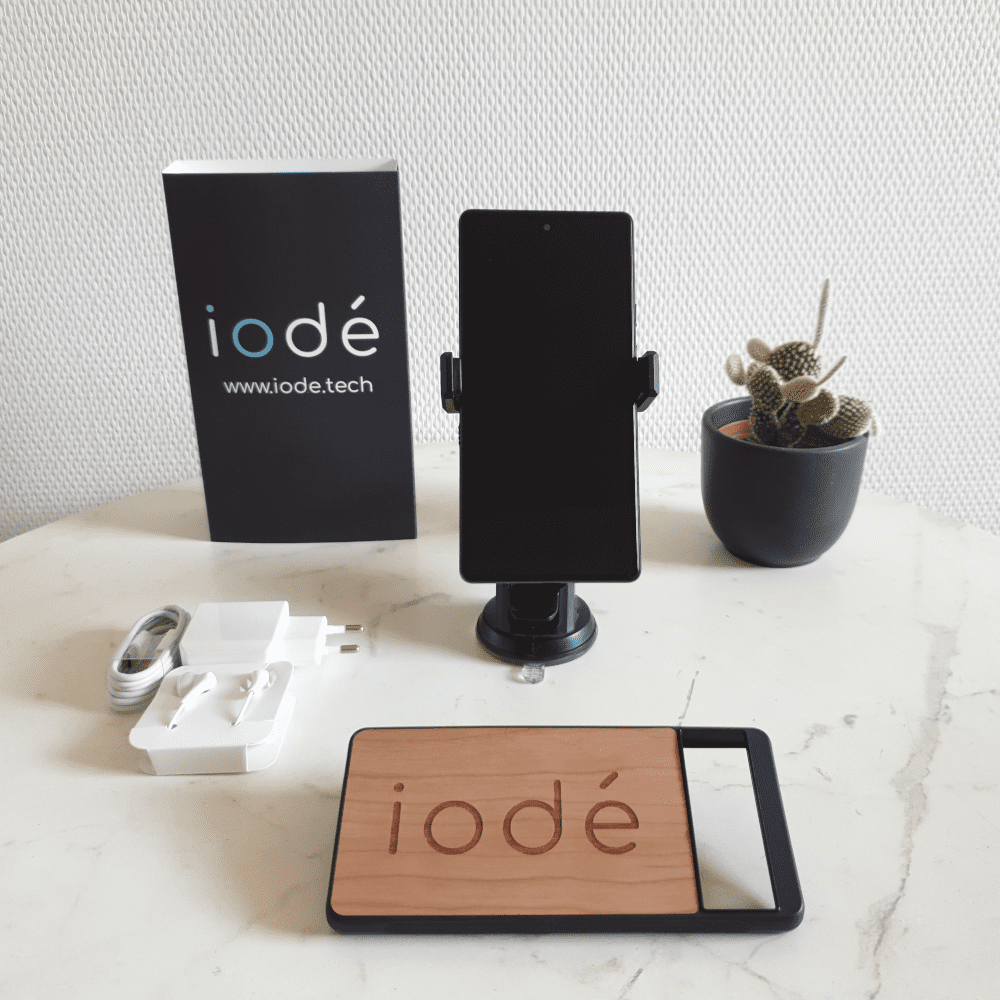iodé turns your Android phone into a sustainable privacy fortress

France-based iodé has established itself as a viable option in the smartphone privacy and sustainability niche. The company develops iodéOS, an operating system compatible with many Android devices, and sells devices from other manufacturers that come with iodéOS installed already. The mobile operating system is based on LineageOS.
If you have a compatible phone, you may install the operating system manually on the device at no costs. You may subscribe to premium plans, which are affordable at 3,99€ or 6,99€ to increase the functionality significantly. The base version is free and remains free.
Less tech-savvy users may purchase an unlocked phone from iodé to get started right away. This bypasses the unlocking of the device and the installation of the mobile operating system. The company has released an installer for Windows and Linux recently that you may use on these devices to install iodéOS on devices.
As far as these devices are concerned, you find a selection of Fairphone, Google, Shift, Teracube, OnePlus, Samsung and Xiaomi devices for sale currently. Prices range from less than 200€ to more than 800€ for the latest and greatest Fairphone.
Some phones come in different variants, e.g., with different storage. Buyers may also subscribe to iodéOS for less when they buy a phone. The phone is more expensive than at the manufacturer's website, but you need to consider the installation of the mobile operating system on the device when judging it.
iodé: benefits
All phones, bought or self-installed, offer improved control and privacy. One thing that you may notice immediately is that there is less Google on the device. The benefit here is that it increases privacy right away. Play Store is missing and you will also notice that core Google apps are also not installed.
You get two alternative appstores, F-Droid and Aurora, that you may install apps and games from. With that said, microG services are installed by default, which replaces Google Play services on the device. Similarly, Google Cloud Messaging (GCM) is installed as a push notifications provider. This enables push notifications on the device. Both services may be disabled or uninstalled, if that is preferred.
You may disable the options during the initial setup though. You may also add a Google account to start using products such as Gmail on the device.
The operating system comes with a selection of privacy-friendly apps that are preinstalled. There is the Google Maps replacement Magic Earth, the iodé Browser, which is based on Firefox, and the open source notes taking application Carnet. Users control these applications, which means that you may remove them from the device.
Apart from these benefits, you will also receive updates regularly. These updates keep the phone secure and maintained, even if the original manufacturer has long abandoned the device.
Privacy protections
All devices come with standard ad-blocking protections. Just launch the iodé application to check out the functionality. Only subscribers get access to additional blocking options. These include better adblocking protections and options to block adult and unethical social media traffic.
The developers have removed all Google trackers from the device. The integrated privacy app displays connection information about each app on the device. This includes information about recipients and the data that they want to collect, the option to block recipients, e.g., to prevent malware, advertisement, tracking or spam on the device.
The operating system monitors DNS requests and network packet transmissions. Anything that is considered advertisers or trackers is blocked. Premium users to get more control over this, but the basic option works well already.
Another interesting privacy option that is provided allows you to block networks. You can disable "Wi-Fi, mobile data or VPN" network traffic individually on the device. This is different from vanilla Android, which may block multiple connection types when you block one. Note that this feature requires a premium subscription and that you may set these up for individual apps or system-wide.
Daily Use
The device comes with a good selection of core apps. You get a browser, weather app, notes taking app, two stores, clock, calculator and pretty much any other standard app that you can think of.
Apps may be installed using any of the two Stores. If you can't live without WhatsApp, Facebook, TikTok or Monopoly Go, then you may install these apps and start using them immediately.
The current version of Android was version 13 on the test Samsung device. It gets updates regularly, which is great for security and stability. Note that we did not receive any form of compensation for the review.
Once you have installed all the missing apps, your experience matches that on vanilla Android devices for the most part. You still benefit from integrated ad-blocking on the device and improved privacy, thanks to the removal of Google trackers.
Updates are published regularly. The company aims to deliver updates every 2 months to the stable channel. There is also a beta channel, which gets updates more frequently.
There is one potential downside. Some apps may not work on the device. There are two main reasons for that. Either, because it requires Google Play Services and is not supported by microG services, or because of the integrated firewall that blocks connections to protect your privacy. The second case is rare though iodé told me and fixable through firewall rules.
Verdict
Privacy and sustainability are the two main selling points. You may extend the life of your devices, provided that they are compatible with the mobile operating system. This alone is great, especially if your device is working perfectly fine even though it has been dropped by the manufacturer already.
Privacy is a core feature of iodéOS, and it is baked into the operating system. Add the removal of Google features and trackers from the device, and you get a device that protects your privacy a lot better out of the box.
Installation of the operating system is technical. The community maintains a list of devices that are compatible and you find installation instructions on the official Gitlab project repository.
Now You: what is your take on iodéOS?






















I’m always curious with OS-es like these if banking and government apps are working correctly?
Would be nice to see a comparison with /e/, GrapheneOS, PostmarketOS, etc.
Privacy wise there are better options
https://eylenburg.github.io/android_comparison.htm
“You may also add a Google account to start using products such as Gmail on the device.”
Doesn’t this decisively and absolutely defeat the entire purpose of using iodeOS? It seems one Google product will infect the entire system with either blatant or esoteric tracking measures that defy the aims and goals of using an alternative mobile OS.
Google and Microsoft–how to exterminate/vaporize them from one’s tech life 100% without jumping onboard something worse?
Such companies are like the winter ants–they adapt and come back with modified, enhanced genes that defy the previous successes in stopping their invasion of the cupboards.
Why? Just don’t give the gmail app foreground permission, run at startup, access to scan for wifi networks in the background, location data, contacts data, etc – and you can turn it into a normal app.
…this is not for the mass of people… i think that what iodé does should be the responsibility of state regulations and laws prohibiting the sale and circulation of spy phones as a base line for data protection and privacy. Yet there are no governments doing that because all this techniques are a powerful extension for secret services…
Security and privacy fortress. Pegasus spyware is securely laughing like there was no tomorrow.
Most of us Americans would like a little independence too. Were caught in that stranglehold also. The others are just f*cking crazy loons!!!
That is a very short list of compatible devices :(
…and why not create a special section here with alternative mobile phone operating systems?
The French are like the only Europeans who make an effort to bring a bit of independence for Europe from the US digital/internet and corporations/politics stranglehold.
Besides that the US technology is often mediocre and outright silly, but gets market share because of the large US consumer market, global politics and the language.